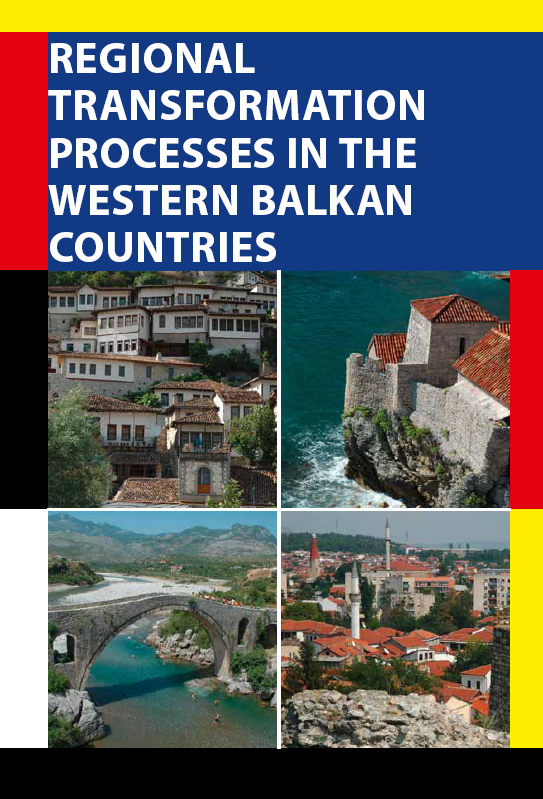 |
REGIONAL TRANSFORMATION PROCESSES
IN THE WESTERN BALKAN COUNTRIES Editors: Horváth, Gyula and Hajdú, Zoltán
Centre for Regional Studies
Pécs, 2011 640 p. ISBN 978 963 9899 37 7
|
The Balkans have been a major focus for the interest of Hungarian political activity and scientific research for centuries, and historically changing Hungarian ambitions long preceded the development of modern social sciences. In this era of modernisation, however, Hungarian science has turned towards defining political objectives in relation to the Balkans.
Faced by the increasing speed of modernisation, the Ottoman Empire became an ’area of traditionalism’. The region, excluded for centuries from the mainstream of European development, became a buffer zone for the Great Powers from the 1870s. This resulted in the outbreak of World War I, following which a totally new state structure was formed.
Post-World War II, the maverick politics of Yugoslavia was the centre of international political interest for a number of years. Tito’s regime, manoeuvring effectively with the power techniques of the self-administrative system, produced substantial results in the transformation of the country’s spatial structure. The results achieved in moderating the remarkably high level of spatial disparities (by European standards) and progress in the internal cohesion of the federation, attracted the attention of regional political experts. Spatial development programmes were implemented in the most underdeveloped member states of the federation to promote the industrialisation of underdeveloped areas, the establishment of an institutional systems of human resources, the development of modern infrastructure and services. Despite this maverick communist ecomonic policy, there was only a modest decrease in the large disparities within the region. These differences showed the low degree of efficiency of the federal state organisation.
The economic performance of individual member republics also showed large disparities in the mid-1970s. The GDP of Slovenia, the most developed part of the country, was twice the average value characterising Yugoslavia as a whole, whilst GDP per capita in the least developed part, Kosovo, was only one-third of the national average. The societies of Croatia (exceeding the national average by 125%), the Voivodina (119%) and Slovenia were very reluctant to support the redistributive burdens stemming from the high degree of public support granted to underdeveloped areas. This development policy paradigm, and the permanent debates surrounding it, have all contributed to the collapse of the Federal Republic of Yugoslavia.
The collapse of Yugoslavia added a new dimension to the problem of regional inequalities. Becoming former regions to independent states resulted in territorial changes. The disparities between smaller areas within the new countries became more apparent. Serious problems were posed by the new state organisation also. During the initial phases of the organisation of the new state formations, spatial aspects were obviously neglected. The transformation of regions into a state can certainly not be regarded as traditional spatial organisation, and the consequences of social practice lacking experience were clearly visible in the various development paths of the new states of the West Balkans. The requirement for decreasing spatial disparities is among the priorities of state organisation in the new countries, while state policy focusing on the system of institutions and instruments guaranteeing the creation of new national identities placed less emphasis on this.
The questions of the stabilisation of the Balkans region are very much in the limelight of international political thought, planning and action. During the previous decade and a half, a great number of political documents focused on the objectives, instruments and institutions of the peaceful development of the West Balkans. The significant financial resources show the weight of this policy. The EU membership of several West Balkan states has been promoted by several current member-states, and EU accession is counted among the priorities of the development strategies of these new states.
The present volume analyses the spatial structure of the countries of the Western Balkans as well as the factors contributing to this. A notable feature of recent decades has been an increase in spatial disparities. The earlier (tenfold) differences in income between regions continue to grow, but, more favourably, in addition to the relatively peaceful political conditions, other key factors in the development of the Balkans may be the strengthening of cohesion and the effective implementation of structural policy. A detailed study of spatial disparities is invariably needed before the implementation of modern spatial policy. We must be aware of the factors contributing to regional inequalities, the ideas voiced concerning their moderation, and whether the institutional system of state administration is sufficient to undertake these tasks.
The ideas concerning the spatial development of countries of the Western Balkans – Albania, Bosnia and Herzegovina, Croatia, Kosovo, Macedonia, Montenegro and Serbia – will, hopefully, be in the limelight of political action, and we can likewise hope that this volume will help to achieve this.
The volume (published as a part of the series “Europe of the Regions”) presents the spatial specifics of Western Balkan countries. It gives an overview of the more typical features of different eras in the transformation of the area, undertakes an evaluation of the effects of regional disparities and outlines the development perspectives for the region.
The book is a result of the joint cooperation of the OECD LEED (Centre for Local Development, Employment and Labour Markets) Trento and the Centre for Regional Studies of the Hungarian Academy of Sciences.
International conference on "Regional Transformation Processes in the Western Balkan Countries" (Pécs, Hungary
24–25 February 2011). Participation at the Conference is free of charge, however, registration is required.
24–25 February 2011). Participation at the Conference is free of charge, however, registration is required.
The Book is supported by the European Commission, and co-financed by the European Social Fund.
Related files

